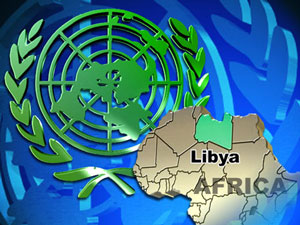- Progression towards United States of Africa continues (FCN, 07-21-2005)
- Mandela blasts U.S., Britain for failure to life Libyan sanctions (FCN, 03-26-2001)

UNITED NATIONS (FinalCall.com) – The 192-nation UN General Assembly elected the Socialist People’s Libyan Arab Jamahiriya to the 15-member Security Council on Oct. 16, with no public objections from the United States or Britain. The U.S. had successfully blocked Libya’s attempts to serve on the council in 1995 and 2003–at the time, the North African nation was under UN sanctions because of the 1988 bombing of a Pan Am flight 103 over Lockerbie, Scotland.
Libya’s ambassador to the UN, Giadalla A. Ettalhi, told reporters after the vote that his government met its Lockerbie obligations. “The issue is behind us. I think our relations with the U.S. are back to normal,” Amb. Ettalhi stressed. He hailed the vote as a special moment for his nation. “It means, I can say, we are back in the international community; that all the problems we have faced in the past are now behind us.”
“We will work with them and hope they will play a constructive role,” stated U.S. Ambassador Zalmay Khalilzad.
“We’ll look forward to begin to work with them as we would with all other members of the UN Security Council. And we would hope that Libya and all the new members would work in support of the principles of the [UN] Charter and contribute effectively to the working of the Security Council,” Tom Casey, deputy spokesman for the Department of State told reporters at the media briefing on Oct. 16.
Stephen Hayes, president of the Corporate Council of Africa stated in a Oct. 8 story on allAfrica.com that “there is a very practical rationale behind the recent moves by Libyan President Moummar Ghaddafi to gain acceptance in the world community.”
Habib Ghanim, president of the Washington, D.C.-based Arab-American Chamber of Commerce, in the same story, said he believes that this “newly founded relationship” between Libya and the international community “holds” great potential for them as the sleeping giant on the North African scene.”
On Oct. 2, the UN News Service ran a story that was also carried by allAfrica.com concerning Libya’s call for Security Council reform. Abdurrahman Mohamed Shalgham, secretary of the General People’s Committee for Foreign Liaison and International Cooperation, said there has been an absence of progress towards reforming the Security Council despite intensive consultations. He called for a meeting of top national leaders in Geneva to address the issue.
“Efforts to reform the council should involve consideration of a new formula for permanent membership under which it would be awarded to geographical blocs and not to specific countries,” Mr. Shalgham stated. The African Union, he added, should be granted permanent membership on the Council “with all the privileges enjoyed by other permanent members,” since Africa is the only continent which has no representative amongst the permanent members.
Libya’s two-year term begins on January 1, 2008. They will be joined by new members Burkina Faso, Costa Rica, Croatia and Viet Nam.
The newly-elected nations will replace Congo, Ghana, Peru, Qatar and Slovakia.
The terms will mark the Security Council debut for both Viet Nam and Croatia, while it will be the second occasion for Burkina Faso (1984-85) and Libya (1976-77) and the third stint for Costa Rica (1974-75 & 1997-98). The 10 non-permanent members do not have the power of the veto.












